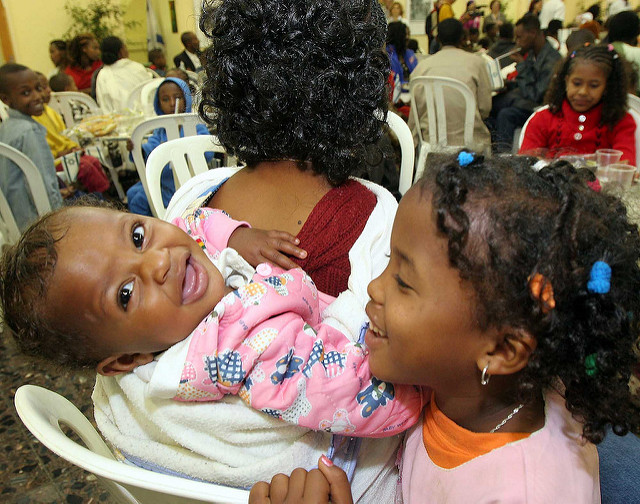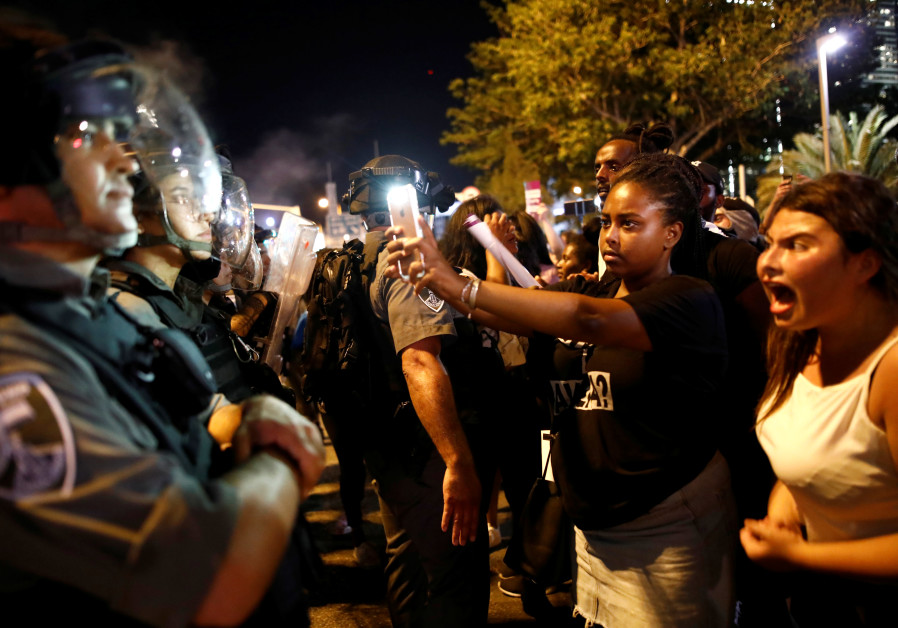Problems in the Israel They Dreamed Of
"The concept was that they [airlifted Ethiopian Jews into Israel] would develop best as a community."
"That was a historic mistake."
Isaac Herzog, former minister of social services and welfare, Israel
"It's very difficult as someone who's black to get the same opportunities [as the rest of Israel's Jewish population]."
"People find it very hard to see you as equal."
Alamito Itzhak, Ethiopian Jew, 32, Netanya, Israel
"[Getting to Israel was] like touching the moon."
"Is this the Israel we dreamed of? It's a question I ask."
Zion Getahun, Ethiopian Jew, Netanya, Israel
 |
| Ethiopian Jewish women pray during a Sigd celebration in Jerusalem in 2014. (Wikimedia Commons) |
The Ethiopian Jewish community was a minority in Ethiopia dating back 1,500 years. Theirs was a nomadic lifestyle, and ancient legends kept their Judaism alive and thriving. They call themselves the Beta Israel. In Ethiopia they were termed the Falasha, a derogatory term meaning "outsider". The Beta Israel faced discrimination over the millennia, treated as the 'other'. They lived as discrete groups in little villages, each group isolated from the others, with their own religious traditions, rabbis and houses of worship; un-unified other than in their Judaic faith.
 |
| Ethiopian rabbis (Kessim) at the ceremony of a new spiritual leader in Ashkelon, Israel, in 2012. (Wikimedia Commons) |
The State of Israel 'rescued' Yemeni Jews from Yemen, flying tens of thousands to Israel to become Israeli citizens, in the late 1940s. Operation Magic Carpet brought almost 50,000 Jews of Yemenite heritage to the new Jewish State in its first two years, responding to a forced exodus of Jews out of Muslim-dominated countries when the State of Israel became a reality in 1948. Much later, in 1991, Operation Solomon was launched, when the Israeli military airlifted Beta Israel the third tranche to their new home in Israel.
The clandestine and dangerous flights took people living in traditional nomadic lifestyles that saw few advances in what we call civilized, urban life and placed them overnight into a sophisticated advanced, technological environment where everything was new and both exciting and frightening for the transferred people. But people are adaptable, and over time newer generations had no problems adjusting to the normal social life everyone else took for granted.
The religious orthodox community hesitated to consider the Ethiopian Jews as truly Jews; their exposure to the Judaic traditions and heritage was not the same as that of the Ashkenazi Jews from Europe. Moreover, they were black, backward, uneducated and viewed as decidedly second-class both in their social tradition and their religious devotion. Israelis in general may have felt happy and excited to 'rescue' Yemenite and Ethiopian Sephardic Jews, but their 'differences' set them apart.
 |
| An Ethiopian Jewish family shortly after arriving in Israel in 2009. (Jewish Agency for Israel/Flickr) |
There are now 150,000 Ethiopian Israelis in a greater population of 9 million Jews, Arabs, Kurds, Druze, Circassians and others. As a distinctly visible minority, Ethiopian Jews feel not fully accepted as equals in Israel, and with good reason. They are as discriminated against in Israel as blacks are everywhere else where they represent a minority group. They face discrimination in opportunities, in medical care, in education, employment, housing and social benefits.
Civil institutions fail to respond to their needs equally with that of other Israelis. Ethiopian Jews are disproportionately arrested, held in prison for minor offences, and targeted by police. "They know we don't have money for lawyers. They know we can't defend ourselves", said Izra Ayalo, 25, who tells a story of an officer raising his fist against him with no exculpatory provocation, while the police commander stood by, laughing as the young man flinched.
There is systemic racism involved, generally known and accepted, but not by the Ethiopians. Very recently an 18-year-old Ethiopian Israeli was shot and killed by a police officer who claimed he was defending himself from physical violence during an altercation. And though Israeli authorities admit to 'over-policing' being a problem where police become overly aggressive responding to minor misdemeanors, the situation remains, and the Ethiopian community has risen in protest leading to riots.
 |
| A firefighter extinguishes a car fire during a protest against the death of 18-year old Solomon Tekah, in Tel Aviv, Israel July 2, 2019. |
The original enthusiastic reception of Israelis to the 'homecoming' of the largest wave of Ethiopian Jews to arrive in 1991 hardly reflects the social climate of the present. In the general Jewish population 40 percent of Jews have achieved an academic degree while only 20 percent of Ethiopian Israelis growing up in Israel have managed to. Household income in the Ethiopian Israel community is stuck at 2/3 of that of other Israelis. Alamito Itzhak earned her teaching certificate but is unable to land a teaching position, so she works as a cashier in a supermarket.
Zion Getahun, as a teen 40 years ago, grew up hearing his grandmother's spoken dreams about living in Jerusalem. He walked hundreds of kilometers from his Ethiopian village to reach a camp in Sudan. From that camp he had been airlifted to Israel. He is still waiting to view the Israel his grandmother dreamed about, a land of recognition, equality and opportunity.
 |
| Protesters stand opposite police during a protest for the death of 18-year old Solomon Tekah of Ethiopian descent, after he was shot by police, in Tel Aviv, Israel July 2, 2019. (photo credit: CORINNA KERN/REUTERS) |
"The death of Solomon Tekah is a great tragedy. Our hearts are with the family and lessons will be learned, but one thing is clear: we cannot tolerate the violence we saw yesterday, we cannot see the blocking of roads, Molotov cocktails, attacks on police and citizens and private property. This is something that cannot be tolerated, and the police are preparing accordingly to prevent it."
"[The Ethiopian-Israeli community] is dear to us [but Israel is a state of law, and demands that] everyone respect the law."
"One thing is certain, this cannot be dealt with by blocking roads, and it cannot be dealt with violently."
"We worked together and achieved important things for the Ethiopian community in Israel and we have more work to do. But the first thing I ask and expect is that you mobilize your influence to help stop this violence. It must stop immediately."
Israeli Prime Minister, Benjamin Netanyahu
 |
Labels: Discrimination, Ethiopian Israelis, Israel, Protests

<< Home